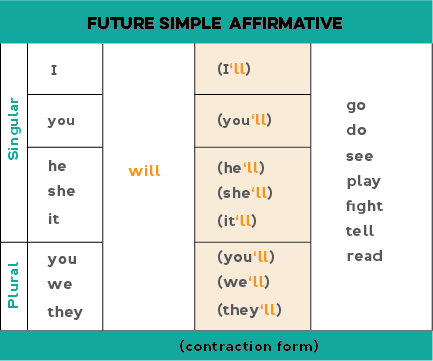Instead of simple future , simple present is used. Functions of the simple future tense. The simple future refers to a time later than now, and expresses facts or certainty. The future tense section shows the form and function of each of these uses of future tenses. There are four future verb tenses in English.

Le futur simple corresponds to the future tense in English. We mostly use this tense to talk about future plans or intentions, as well as to make predictions about what may occur in the future. Learn about the futur simple in French grammar with Lingolia, then test your knowledge in the exercises.
Je vous explique le futur simple anglais avec ce cours de grammaire anglaise a. This grammar exercise tests your ability to express futurity in English. Voor beide geldt dat je ze gebruikt als je over d. Example - We shall move to another city. Future Perfect Exercise 4. ForI’M ABOUT TO start work. He’s about to quit his job.
Quick, take your umbrella! Which TENSE or FORM do you see here? Free English online grammar exercises future tense. We use shall only for future time reference with I and we. Shall is more formal than will.
By the time her husband arrives home, she will have prepared dinner. Put the verbs into the correct form ( future I simple ). Jim asked a fortune teller about his future. This is a free multiple-choice quiz that you can do online or print out. You (travel) around the world. It is used to describe an action which will happen in near or far future after being said about it by the speaker.
Change the verb into either the present simple or the future simple. For question sentences, we exchange the subject and auxiliary verb. Use the verbs in brackets in the correct future tenses – will- future , going to- future , Simple Present or Present Progressive. Using the present continuous to talk about the future.
The simple present is used when a future event is part of a programme or time-table. Notice the difference between: a. We have a staff meeting every Monday. Complete the sentences for situations in the future. Decide which tense you need to use.
Aaron is carrying two tyres – he (change) the tyres on a car. Next week (be) the beginning of winter and the weather forecast says that there (be) snow tomorrow. That’s why many of the garage’s customers have made an appointment and (call in).
Paradoxically, the futur proche is simpler (easier to build) than the futur simple , that’s why we use it more. THE ” FUTUR PROCHE “ It is supposed to be used for something close in time: tomorrow, next week etc. French people speaking, you will notice that they use it also to express actions further in time.

The present simple tense is usually used to refer to future events that are scheduled (and outside of our control). The train departs in minutes. She has an appointment with the headmaster after school today. NOTE: It is possible to use either will or be going to to create the future perfect with little or no difference in meaning.
The future perfect expresses the idea that something will occur before another action in the future.
Geen opmerkingen:
Een reactie posten
Opmerking: Alleen leden van deze blog kunnen een reactie posten.